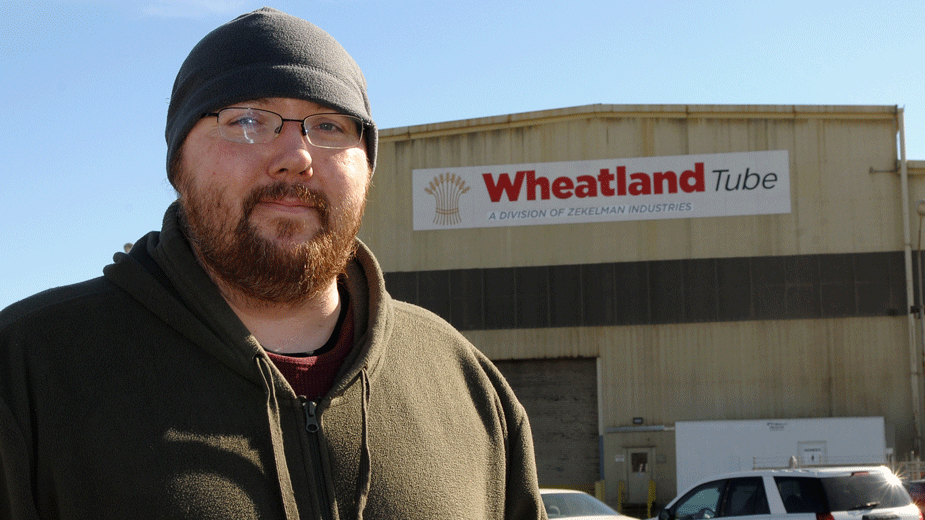Trump Tariffs Applauded, Others ‘Sweating Bullets’
YOUNGSTOWN, Ohio – Fred Pistorius left work Monday afternoon with the sense that better days are ahead for the company he’s spent 16 years with.
“Everyone is pretty optimistic,” says Pistorius, an employee at Wheatland Tube Inc.’s pipe and tube mill in Wheatland, Pa. “The department I’m in is already working six days a week, and I get the feeling it’s going to get a lot busier.”
Just six miles away across the state line in Vienna Township, Ohio, however, is an entirely different take.
“We’re sweating bullets right now,” says Dale Foerster, vice president of Starr Manufacturing Inc. “We’re flabbergasted and not happy about this.”
Both reactions are in response to President Donald Trump’s announcement last week that his administration plans to impose global tariffs on steel and aluminum. Last Thursday, Trump declared that the United States would initiate a blanket 25% tariff on steel imports – including pipe and tube – and a 10% tariff on aluminum imports entering the country.
That means steel and aluminum that enter the U.S. from other countries would be slapped with a hefty tax, hiking the price of imports. And, most likely the price of domestic steel would rise as well, since competition from foreign steel would be reduced substantially.
Those in the steel and tube industry say that such action has been a long time coming. For decades, executives and organized labor representing steel producers and their workers have agitated for some type of retaliation against countries that ship high volumes of low-cost steel to this country – a practice known as “dumping.” Cheaply priced imports, they argue, have led to the loss of thousands of jobs across the domestic steel industry.
“We’ve fought unfair trade for years and years,” says Karen Yanak, president of United Steelworkers Local 1660, which represents about 300 workers at Wheatland Tube’s Wheatland plant. “This is good for the pipe business overall. It will allow us to compete on a fair playing field.”
As a result of the tariff announcements, Barry Zekelman, executive chairman and CEO of Wheatland Tube’s parent company, Zekelman Industries, said in a letter to workers that the company would award $1,000 annual bonuses as long as the tariffs are in place.
Yanak has worked at the plant for 30 years and has witnessed both good times and difficult periods. Trump’s tariff proposal, she says, brings a sense of stability and certainty to Wheatland’s operations. “We’re appreciative, happy and pleased that the result of these tariffs will secure our jobs for the future.”
Other workers at Wheatland agree, and believe that the Trump administration is on their side when it comes to trade issues and protecting workers’ jobs.
“I voted for Trump,” says Rick Taylor, who has worked at Wheatland for 25 years. “I think he definitely has the right idea about taking care of this country first, which hasn’t been done for a long time.”
Still, the longtime steelworker adds he’s uncertain as to how these tariffs will impact other industries and businesses.
“It’ll be good for the steel industry. I’m just a little skeptical about what it’s going to do for other parts of the economy,” he says.
Starr Manufacturing’s Foerster emphasizes that these measures will only serve to disrupt business and harm the overall economy, since domestic manufacturers rely on strong reciprocal relationships with other countries to do business.
“We live in a global market,” she says. “This is not 1946,” when the United States enjoyed unprecedented global economic and military superiority after World War II.
Starr Manufacturing fabricates systems used in the natural gas and oil, mining, energy, materials handling, waste management and original equipment manufacturers markets. As such, the company purchases steel from a variety of sources, including some internationally, to manufacture products, Foerster says.
These tariffs stand to hit fabricators like Starr Manufacturing hard, because some of the steel it purchases isn’t produced in the United States. “Some of the products we use on the oil and gas end don’t come from the U.S.,” she says.
It makes more sense to isolate those countries that have circumvented U.S. trade law such as China and target them with punitive trade sanctions, not countries who act as responsible trading partners, Foerster says.
As it stands, steel or aluminum imports from any country would be subject to tariffs, including longtime trading partners in North America, South America and Europe.
“All of these products that go back and forth will dry up,” she says. And although the tariffs are specific to steel and aluminum, these are commodities that have widespread use across the economy, she notes.
Starr Manufacturing’s president, Andreas Foerster, says that its sister company – Procon Metals – could possibly go out of business should these tariffs take effect. The company engineers and designs products that contain specialty metals not produced in the United States.
“It destroys the whole business,” he says.
Moreover, he says that the tariffs on steel an aluminum would have a devastating impact on those who work in the metals industry and believes would do little to rejuvenate steel production in this country. “There are many more people working in metals and fabricating than there are in steel production,” Foerster says, noting that sector is likely to shed more jobs than those created in steel production.
Major manufacturers that consume a large amount of steel and aluminum – General Motors Co., for example – are likely to see the costs of their materials rise, making it more expensive to build vehicles. The same goes for aluminum-hungry companies such as Anheuser-Busch and MillerCoors, which have warned of job reductions in the face of these new duties.
“You have to consider potential job losses,” observes A.J. Sumell, professor of economics at Youngstown State University. Tariffs likely mean higher prices for consumers, and while it might help producers in the local economy, these measures stand to have a negative effect across the country.
Employment in the aerospace and automotive industries – some of the largest consumers of steel and aluminum – would be impacted as a result of Trump’s tariff policy, Sumell says. “Car and aircraft manufacturers employ much more than steel and aluminum producers do in this country,” he says.
Sumell cites as an example an existing duty on sugar, which protects producers in this country that collectively employ about 12,000 people. However, the amount of jobs lost among high volume businesses that use sugar as a major ingredient is far higher than those employed on the production end.
“The price of sugar is significantly higher and in the past decade we’ve lost 120,000 jobs in domestic sugar-intensive industries such as candy, soda and cereal,” he says. “It’s not a mystery as to why those jobs were lost.”
Sumell acknowledges tariffs are justified in some cases, and the ones announced by Trump should help domestic steel producers who for decades have maintained they’ve been cheated by low-priced imports. “There are some jobs that can be gained here,” he says. “It might help the Youngstown economy, but it might hurt the national economy.”
Local pipe and tube manufacturer Vallourec Star, which operates a melt shop and rolling mill at its complex off of Martin Luther King Jr. Blvd. in Youngstown, said last week it would examine in closer detail Trump’s plan.
Vallourec SA, based in Boulogne-Billancourt, France, is the parent of Vallourec Star and presents a complicated case related to the proposed duties.
French Finance Minister Bruno Le Marie said last Friday that Europe would retaliate with a joint response should Trump’s duties go forward, stoking fears of an international trade war. Among the French companies that could be impacted is Vallourec, he said.
Yet Vallourec Star’s Youngstown complex might benefit, since the operation melts scrap steel on site and manufactures pipe used in the North American oil and gas industry – products protected under the tariffs.
In a statement issued last week, Vallourec affirmed that it was “awaiting more details of the tariff proposals,” and that the company was “assessing the impacts of an across-the-board tariff imposition upon our business and our own supply chain.”
Rick Fryda, CEO of Compco Industries in Columbiana, observes that domestic steel producers have already started to increase prices. “It’s going to impact our costs,” he says.
Compco manufactures metallic tank heads for several industries and operates two other facilities that use steel to manufacture products for the stamping industry and vehicle markets.
Fryda says the majority of steel Compco uses is sourced from domestic mills, but it also does business with companies in Canada. He thinks it’s unfair to penalize those countries that have acted in good faith over the years and enjoy a strong trading relationship with the United States.
“As far as I’m concerned, we’ve had fair trade with Canada,” Fryda says. Instead, tariffs should be placed on those countries that have found to be in violation of U.S. trade law, namely China. “It can’t be a blanket 25%,” he says. “It should be on a case-by-case basis.”
Trump has dismissed any repercussions of a trade war triggered by the imposition of new duties, calling them “easy to win.” As of Tuesday, the president appeared to reinforce his position noting that a trade war “wouldn’t hurt us.” On Monday, Trump left open the possibility of exemptions for countries such as Canada and Mexico, under the conditions that they renegotiate the North American Free Trade Agreement, or NAFTA.
U.S. Rep. Tim Ryan, D-13, who has championed trade sanctions against countries such as China from his first days in office, said last week that he applauded the Trump administration’s announcement.
In a letter addressed to Trump on Tuesday, however, Ryan urged Trump to use the steel and aluminum tariffs to punish “bad actors” such as China and Russia, not allies such as Canada.
“The implementation of these tariffs will only succeed and provide stability to the market if the trading partners that work with the United States are exempted,” Ryan wrote.
Meanwhile, business owners such as Andreas Foerster are trying to dig more into the details of the Trump administration’s proposals, and perhaps tap into the psyche of this unpredictable president.
“He might be orchestrating a huge bluff,” Foerster says. “At least, that’s what I’m hoping.”
Pictured: Fred Pistorius of Wheatland Tube says the mill has gotten busier in recent months.
Copyright 2024 The Business Journal, Youngstown, Ohio.


